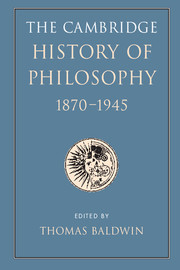Book contents
- Frontmatter
- Contents
- List of contributors
- Introduction
- I 1870–1914
- 1 Positivism, Idealism, and Pragmatism
- 1 Positivist thought in the nineteenth century
- 2 Neo-Kantianism: the German idealism movement
- 3 Idealism in Britain and the United States
- 4 Idealism in Russia
- 5 Bergson
- 6 Pragmatism
- 2 Psychology and Philosophy
- 3 Logic, mathematics, and judgement
- 4 Philosophy and the new physics
- 5 The idea of social science
- 6 Ethics, politics, and legal theory
- 7 Philosophy of religion and art
- Interlude
- II 1914–1945
- Biobibliographical appendix
- Bibliography
- INDEX
- References
1 - Positivist thought in the nineteenth century
from 1 - Positivism, Idealism, and Pragmatism
Published online by Cambridge University Press: 28 March 2008
- Frontmatter
- Contents
- List of contributors
- Introduction
- I 1870–1914
- 1 Positivism, Idealism, and Pragmatism
- 1 Positivist thought in the nineteenth century
- 2 Neo-Kantianism: the German idealism movement
- 3 Idealism in Britain and the United States
- 4 Idealism in Russia
- 5 Bergson
- 6 Pragmatism
- 2 Psychology and Philosophy
- 3 Logic, mathematics, and judgement
- 4 Philosophy and the new physics
- 5 The idea of social science
- 6 Ethics, politics, and legal theory
- 7 Philosophy of religion and art
- Interlude
- II 1914–1945
- Biobibliographical appendix
- Bibliography
- INDEX
- References
Summary
INTRODUCTION
The positivist impulse, to accept only what is certain and to reject anything in any degree speculative, from its earliest intimations in classical Greece to its most recent revival in contemporary anti-realist philosophy of science, expresses itself in two main ways. It appears as a doctrine about the limits of what human beings can legitimately claim to know, displayed as an austere epistemological attitude. This leads to a foundationalism according to which only what is immediately given by the senses can be known for certain. It also appears as a doctrine about what can legitimately be taken to exist, displayed as an austere ontological attitude. This leads to a scepticism about the existence of unobservables of all sorts, from God to the material substance thought by many philosophers and scientists to account for common experience. Positivism is at root driven by an impulse, attitude, or frame of mind, which expresses itself in a variety of philosophical theses and arguments. That positivistic arguments and analyses are found convincing has perhaps more to do with an attitude of austerity and scepticism, than with their intrinsic worth. Always ready to wield Ockham’s Razor against the proliferation of kinds of entities which people are tempted to believe in, positivists could be said to hold that it is better to accept less than one perhaps could, for fear of believing more than perhaps one should.
The topic of this chapter, the rise of positivism in the nineteenth century, picks out just one of the high points of a repeated cycle of waxing and waning enthusiasm for positivist austerity. Harsher and more relaxed attitudes to what one should reasonably believe have come and gone since antiquity. In the sixteenth century the debates about astronomy turned on an opposition between positivism and realism in science. Should one believe in the reality of the heliocentric theory or was it just a convenient calculating device for predicting the comings and goings of ‘lights in the sky’?
- Type
- Chapter
- Information
- The Cambridge History of Philosophy 1870–1945 , pp. 7 - 26Publisher: Cambridge University PressPrint publication year: 2003



